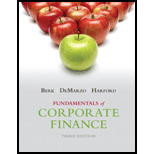
Preferred stock is a part of total share capital of the company. It is a class of title holders that carry some preference rights against dividend and returning of principal amount at the time of winding up of the company. These shareholders are paid fixed rate of dividend before any dividend is paid to common shareholders but they do not carry any voting rights.
Common Stock:
Common stock is a class of title holders in a company that carry risk against dividend but they are the real owners of the company as they carry voting rights and they can take part in the decision making process of the company. These shareholders have the right to receive dividend after preference shareholders and incase company goes bankrupt these stockholders will not receive their money until preference shareholders and creditors receive their unpaid amount.
To explain:
The differences between preferred stock and common stock.
Want to see the full answer?
Check out a sample textbook solution
Chapter 7 Solutions
Fundamentals of Corporate Finance (3rd Edition) (Pearson Series in Finance)
- Explain why long-term bonds are subject to greater interest rate risk than short-term bonds with references or practical examples.arrow_forwardWhat does it mean when a bond is referred to as a convertible bond? Would a convertible bond be more or less attractive to a bond holder than a non-convertible bond? Explain in detail with examples or academic references.arrow_forwardAlfa international paid $2.00 annual dividend on common stock and promises that the dividend will grow by 4% per year, if the stock’s market price for today is $20, what is required rate of return?arrow_forward
- General Financearrow_forwardAs CFO for Everything.Com, you are shopping for 6,000 square feet of usable office space for 25 of your employees in Center City, USA. A leasing broker shows you space in Apex Atrium, a 10-story multitenanted office building. This building contains 360,000 square feet of gross building area. A total of 54,000 square feet is interior space and is nonrentable. The nonrentable space consists of areas contained in the basement, elevator core, and other mechanical and structural components. An additional 36,000 square feet of common area is the lobby area usable by all tenants. The 6,000 square feet of usable area that you are looking for is on the seventh floor, which contains 33,600 square feet of rentable area, and is leased by other tenants who occupy a combined total of 24,000 square feet of usable space. The leasing broker indicated that base rents will be $30 per square foot of rentable area Required: a. Calculate total rentable area in the building as though it would be rented to…arrow_forwardDon't used Ai solutionarrow_forward
- General Finance Questionarrow_forwardConsider the following simplified financial statements for the Yoo Corporation (assuming no income taxes): Income Statement Balance Sheet Sales Costs $ 40,000 Assets 34,160 $26,000 Debt Equity $ 7,000 19,000 Net income $ 5,840 Total $26,000 Total $26,000 The company has predicted a sales increase of 20 percent. Assume Yoo pays out half of net income in the form of a cash dividend. Costs and assets vary with sales, but debt and equity do not. Prepare the pro forma statements. (Input all amounts as positive values. Do not round intermediate calculations and round your answers to the nearest whole dollar amount.) Pro forma income statement Sales Costs $ 48000 40992 Assets $ 31200 Pro forma balance sheet Debt 7000 Equity 19000 Net income $ 7008 Total $ 31200 Total 30304 What is the external financing needed? (Do not round intermediate calculations. Negative amount should be indicated by a minus sign.) External financing needed $ 896arrow_forwardAn insurance company has liabilities of £7 million due in 10 years' time and £9 million due in 17 years' time. The assets of the company consist of two zero-coupon bonds, one paying £X million in 7 years' time and the other paying £Y million in 20 years' time. The current interest rate is 6% per annum effective. Find the nominal value of X (i.e. the amount, IN MILLIONS, that bond X pays in 7 year's time) such that the first two conditions for Redington's theory of immunisation are satisfied. Express your answer to THREE DECIMAL PLACES.arrow_forward
 Essentials Of InvestmentsFinanceISBN:9781260013924Author:Bodie, Zvi, Kane, Alex, MARCUS, Alan J.Publisher:Mcgraw-hill Education,
Essentials Of InvestmentsFinanceISBN:9781260013924Author:Bodie, Zvi, Kane, Alex, MARCUS, Alan J.Publisher:Mcgraw-hill Education,

 Foundations Of FinanceFinanceISBN:9780134897264Author:KEOWN, Arthur J., Martin, John D., PETTY, J. WilliamPublisher:Pearson,
Foundations Of FinanceFinanceISBN:9780134897264Author:KEOWN, Arthur J., Martin, John D., PETTY, J. WilliamPublisher:Pearson, Fundamentals of Financial Management (MindTap Cou...FinanceISBN:9781337395250Author:Eugene F. Brigham, Joel F. HoustonPublisher:Cengage Learning
Fundamentals of Financial Management (MindTap Cou...FinanceISBN:9781337395250Author:Eugene F. Brigham, Joel F. HoustonPublisher:Cengage Learning Corporate Finance (The Mcgraw-hill/Irwin Series i...FinanceISBN:9780077861759Author:Stephen A. Ross Franco Modigliani Professor of Financial Economics Professor, Randolph W Westerfield Robert R. Dockson Deans Chair in Bus. Admin., Jeffrey Jaffe, Bradford D Jordan ProfessorPublisher:McGraw-Hill Education
Corporate Finance (The Mcgraw-hill/Irwin Series i...FinanceISBN:9780077861759Author:Stephen A. Ross Franco Modigliani Professor of Financial Economics Professor, Randolph W Westerfield Robert R. Dockson Deans Chair in Bus. Admin., Jeffrey Jaffe, Bradford D Jordan ProfessorPublisher:McGraw-Hill Education





